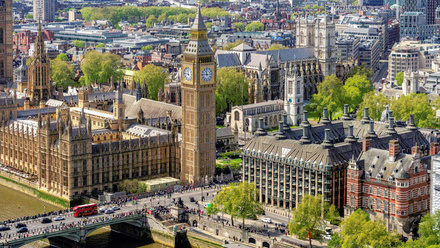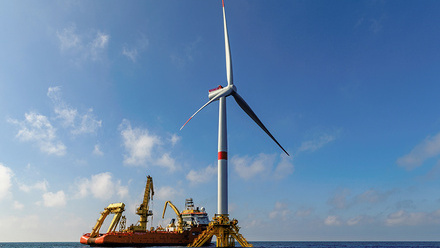UN Conference on Climate Change key outcomes
Baku, Azerbaijan hosted the 2024 United Nations conference on climate change between 11 - 22 November.
The 2024 United Nations conference on climate change, COP29, took place last month in Baku, Azerbaijan. The event ran from 11 to 22 November, however negotiations on the implementation of the Paris Agreement ran overtime and the conference ultimately did not conclude until the early hours of Sunday 24 November. Over 55,000 people attended the conference, including politicians, diplomats and national government representatives, as well as NGOs, activists and industry lobbyists. The two-week event resulted in important outcomes for the green transition globally, as well as relevant takeaways for the materials cycle.
Materials, minerals and mining at COP
Though not a key focus of the COP negotiations, issues relating to the materials cycle were prevalent in events throughout the conference. One significant event was the high-level meeting on resourcing the energy transition. The purpose of the event was to advance the recommendations of the UN Secretary-General’s panel on critical energy materials. The panel was launched in April 2024 and released a series of principles and recommendations in September. These recommendations aim to centre justice and equality in the mining of minerals needed to scale up the transition to renewable energy. The high-level meeting discussed the panel’s findings and next steps. Among the speakers were United Nations Secretary-General Antonio Guterres, International Energy Agency Executive Director Fatih Birol, and Natural Resource Governance Institute President and CEO Suneeta Kaimal.
In his remarks, Secretary-General Guterres highlighted the centrality of minerals to the renewables revolution and noted that the demand for critical minerals is expected to surge in the coming years. He highlighted that while this can present economic opportunities for developing countries endowed with these resources, the rush for critical minerals too often leaves environmental and social damage in its wake. Guterres emphasised the need to empower local communities and ensure that the transition to clean energy drives equitable and resilient growth. He also highlighted the importance of moving forward with a transparency and accountability framework for global mineral value chains, as was proposed by the Secretary-General’s panel in September.
Another relevant event for the mining and minerals sector was hosted by the UN Climate Change Pavilion on the transition from coal to clean energies. This event focused on the Coal Transition Accelerator, an initiative launched at COP28 by French President Emmanuel Macron. The initiative established the Coal Transition Commission, a body co-chaired by France and Indonesia, with the purpose of developing policy solutions to accelerate global coal transitions. At Baku, the Commission launched its first report with recommendations on accelerating the coal-to-clean transition to meet the aims of the Paris Agreement. The event sought to explore the policy solutions forwarded in the first year of the Coal Transition Accelerator, with two panels focused on the planning and financing needed for a successful coal-to-clean transition. Speakers included French Climate Ambassador, Kevin Magron, US Deputy Special Envoy for Climate, Rick Duke and Global Director for Energy and Global Director Energy and Extractives at the World Bank, Demetrios Papathanasiou.
Finally, the Azerbaijan Pavillion hosted a session on managing plastic waste for climate resilience. The event was organised by Azerbaijan’s Ministry for Ecology and Natural Resources and the Regional Environmental Center for the Caucasus. Government officials, international organisations and experts in the field discussed challenges and solutions surrounding the handling of plastic waste. Rauf Hajiyev, Azerbaijan’s Deputy Minister of Ecology and Natural Resources, highlighted that improper waste management can have a disruptive impact on local ecosystems, animal and plant life and human health. Policies such as Extended Producer Responsibility (EPR), recycling promotion and circular economy models were all forwarded as key approaches to managing plastic waste, with their significant roles in advancing climate action emphasised.
For more information on events that took place during the conference and to access available recordings, see the COP29 schedule of events.
The UK Government at COP
The UK had a significant presence at the conference on climate change, with Prime Minister Kier Starmer being one of only two G7 heads of state in attendance. Addressing COP delegates on 12 November, Starmer argued that the world stands at a critical junction regarding climate action. He stressed that the path of inaction will lead to greater national insecurity, heightened economic instability and increased threats from flooding across the UK. Alternatively, he argued that through decisive action, there can be opportunities for greater energy sovereignty, stronger security, increased investment and the development of green jobs.
Starmer emphasised his intention to restore Britain’s role as a global climate leader and announced his government’s ambition to achieve an 81% reduction in greenhouse gas emissions by 2035, compared to 1990 levels. Highlighting steps taken towards these aims, Starmer noted the closing of the UK’s last coal power plant in September, the launch of Great British Energy, the commitment to end new licenses for North Sea oil and gas and new funding projects for carbon capture, utilisation and storage, or CCUS.
Additionally, Secretary of State for Energy Security and Net Zero, Ed Miliband played a central role in this year’s COP. In the last days of the conference, the COP Presidency solicited the support of Miliband, alongside the Brazilian Minister of the Environment and Climate Change, Marina Silva, to achieve an ambitious and balanced negotiation outcome. The process of securing a deal was fraught with contention and required a 35-hour extension of the conference. However, Miliband stated that the 11th hour deal is “the right thing for Britain and the right thing for speeding up the clean energy transition.” He also highlighted that working with other states to tackle the climate crisis has the potential to support British jobs and growth, describing the green transition as the “biggest jobs opportunity of the 21st Century”.
Other notable members of the UK delegation at COP29 include Nature and Circular Economy Minister Mary Creagh and UK Special Representative for Nature Ruth Davis. At Baku, Creagh announced funding for projects that will build resilience to climate change in oceans. She argued that oceans are facing a “triple threat of global warming, pollution and acidification” and that we must “save nature not only for its own intrinsic value but to save ourselves”. Special Representative Davis highlighted that rising ocean temperatures impact marine life in the UK and globally, with adverse effects on the fishing industry. She argued that the UK is leading the way at COP by providing crucial funding for ocean conservation.
The outcome of COP negotiations
The most significant impact of COP29 has been the conclusions of state party negotiations. This year’s COP was dubbed the ‘finance COP’, as the challenge of building consensus around climate finance dominated negotiations. Delegates were tasked with identifying a new collective quantified goal (NCQG) to replace the current US$100 billion invested annually in climate finance. From the outset, developing countries argued that upwards of US$1 trillion was needed to meet the challenges of climate change, while developed nations were reluctant to meet these demands. A draft text of the finance deal released on the morning of Thursday 21 November, just one day prior to the scheduled end of the conference, contained an ‘X’ in place of a quantified annual sum.
The lack of progress on finance sparked backlash from many states, particularly in the Global South. Grievances were expressed during a five-hour open session held by the COP Presidency that day. Negotiations on the NCQG dragged into the weekend and hit a major barrier on Saturday when the least developed countries (LDCs) and the Alliance of Small Island States (AOSIS) temporarily withdrew from talks stating a lack of consultation. The meeting was suspended for several hours, before reconvening after the circulation of new texts.
Just after 3 a.m. local time on Sunday morning a set of decisions was released on issues including climate finance. With regards to the NCQG, states agreed to set a goal of at least US$ 300 billion per year by 2035 for developing countries to advance their climate action. The agreement also called on states to mobilise public and private funding to the amount of US$ 1.3 trillion by 2035. Many developing countries expressed dissatisfaction with the deal, given the significant gap between their financing needs for mitigation and adaptation and the sum committed to. Simon Stiell, Executive Secretary of UN Climate Change, argued that the deal is “an insurance policy for humanity” but must be paid in full and on time.
On a less contentious matter, state parties reached an agreement on Saturday evening on article 6 of the Paris Agreement, pertaining to market-based cooperative approaches. Of particular significance here is article 6.4, which establishes the rules for global carbon markets overseen by the UN and introduces an international registry with the capacity to issue carbon credits. Key issues for state parties were ensuring the scientific integrity of carbon trading schemes, addressing issues of double counting and avoiding adverse impacts of carbon offsetting on the land rights of indigenous peoples. Finalising the scheme is a significant outcome of COP29 and has the potential to spur climate finance and investment.
One area in which parties failed to reach an agreement was on the implementation of the energy package launched at COP28 in the United Arab Emirates. In 2023 states agreed on the need to triple renewable energy capacity and called for a transition away from fossil fuels. Many parties hoped to reiterate and move forward with this pledge, known as the UAE consensus, during the COP29 negotiations. However, the commitment to phase down fossil fuels was not explicitly renewed and a draft text calling on states to reduce investment in fossil fuel infrastructure was rejected. Talks on the implementation of the UAE energy package have been pushed to next year’s COP. Some have argued that the lack of progress in this area represents a step backwards from the ambitions set out at COP28.
Looking Forward
While important steps forward were made, the conclusions of the conference disappointed several state parties and the contentious nature of negotiations raised concerns. Commenting on the results of COP29, UN Secretary-General Guterres said he “had hoped for a more ambitious outcome – on both finance and mitigation – to meet the great challenge we face”. However, he went on to say that the agreements provide a basis upon which to build further and must be honoured in full. Similarly, Executive Secretary of UN Climate Change, Simon Stiell recognised that no country got everything they wanted from the deals and that there is “a mountain of work” still to complete.
A particularly important issue over the coming months will be nationally determined contributions or NDCs. Under the Paris Agreement, emission reduction targets are set voluntarily by each member state through NDCs. Emission reductions under current NDCs are insufficient to limit warming to 1.5C as per the aims of the Paris Agreement, however they are revised upwards every five years. The next revision will take place in 2025 and states are expected to submit their new NDCs nine months prior to COP30 in Brazil next year. Thus, while NDCs were not a major talking point at COP29, they must be grappled with in the near future. Commenting on this issue, Secretary-General Guterres said that the G20 countries, as the biggest emitters, must lead the way. He stated that NDCs should take a whole economy approach and strive to seize the benefits of cheap, clean renewables.








